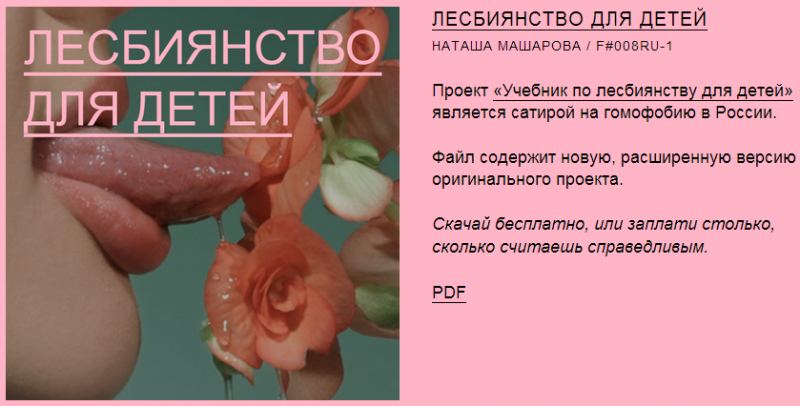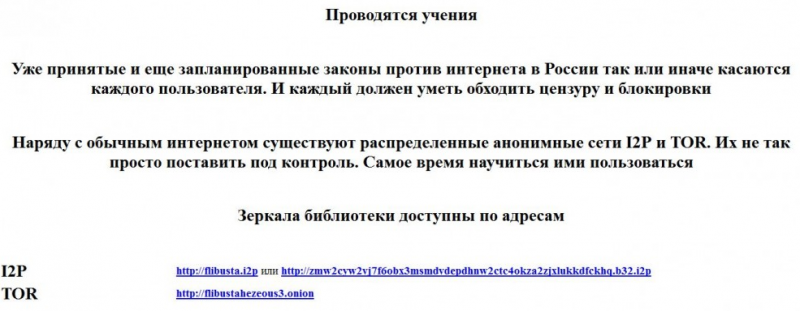
E-textbook “Lesbianism for Children.” An art piece hosted by counter-culture website Looo.ch. Screenshot.
Two months ago the Russian government activated a new weapon in its war on Internet freedom — a broadly framed anti-piracy law [Global Voices report] that makes it extremely easy to shut down any online resource on claims of copyright infringement. For now, this law has been exclusively used by copyright owners [ru] to target Russian torrent websites and filesharing forums [Global Voices report], making it harder for Russians to watch Breaking Bad and Game of Thrones. Other websites, however, can still run afoul of proper censorship from Roskomnadzor, the agency that runs Russia's Internet blacklist registry.
Looo.ch [ru, NSFW], a counter-culture art blog and media platform with niche content and readership (its front page features male genitalia wrapped in a string of pearls and a young girl aiming a gun at her mouth) is the most recent victim of a Russian law banning the propaganda of homosexuality. It was presumably blocked for hosting an art project: two multimedia “textbooks” [ru, NSFW] titled “Homosexuality for Children” and “Lesbianism for Children,” which are meant to be a “satire of Russian homophobia” and contain erotic photos and texts explaining why homosexuality is “great.” Looo.ch itself says [ru] on their Facebook page that they received no reason for being included in the “forbidden websites” registry on September 19, 2013, and called on their users to access the website through TOR. Being on the blacklist means that Russian ISPs are obligated to block access to the website in question.
While the blocking of Looo.ch itself could have gone largely unnoticed, Roskomnadzor was hoisted by their own petard, cutting off internet access to SquareSpace [ru], a hosting platform similar to WordPress that hosts Looo.ch. Confusion over IP addresses of hosters and websites is a constant issue with the blacklist — Roskomnadzor has previously blocked entire websites over a single infringing page. Because of the latest blanket block thousands of websites (26,439 according to looo.ch) were cut off from the Russian market until the issue was resolved. Looo.ch and its “homosexuality propaganda” only gained in notoriety as a result, thinks [ru] nationalist blogger Egor Prosvirnin:
был сайт для леворадикальной интеллигенции с дневной посещаемостью в районе 3000 человек, такое развлечение для узкого круга. Теперь же пресловутый “Учебник гомосексуализма” висит на главной Хабрахабра (и тысяч новостных сайтов и блогов с аудиторией в миллионы посетителей), а 26 000 добропорядочных площадок, включая чисто коммерческие, блокированы в России, при этом файл с “Учебником” гуглится за секунду.
there was a website for radical-leftist intelligentsia with daily visits of around 3,000 people, a diversion for a narrow audience. Now the above mentioned “Homosexuality Textbook” is on the front page of [Russian tech blog] Habrahabr (and a thousand other news websites and blogs with an audience of millions), and 26,000 law-abiding websites [hosted by SquareSpace], including purely commercial ones, are blocked in Russia. At the same time the “Textbook” file can be instantaneously found through Google.
Increasing instances of down-times like this are prompting some websites to take pro-active measures. In mid-September users of the popular free internet depository of pirated books (real books this time, not kinky art-pieces), Flibusta.net (see this Global Voices report for more on Russian pirate libraries), found that they couldn't read or download any books through a regular web-browser. Instead they were taken to a sparse webpage [ru] that said “War games in progress” at the top.

What readers of flibusta.net saw when trying to download a book. Screenshot.
The page explained:
Уже принятые и еще запланированные законы против интернета в России так или иначе касаются каждого пользователя. И каждый должен уметь обходить цензуру и блокировки. Наряду с обычным интернетом существуют распределенные анонимные сети I2P и TOR. Их не так просто поставить под контроль. Самое время научиться ими пользоваться.
Anti-Internet laws already passed or in the planning stages in Russia in some ways affect all users. Every person should know how to counter censorship and blocks. Along with the regular Internet there are the anonymous webs of I2P and TOR. They aren't as easily controlled [by the government]. It's high time to learn how to use them.
The page, which remained in effect for several weeks, gave I2P and TOR addresses for Flibusta, as well as links to FAQs [ru] on how to install, configure and use the programs. Essentially, Flibusta has made the attempt to train their audience to become internet-savvy, an educated and sophisticated force of rule-breakers. Of course, people complained about the added bother — not the least because the TOR network was slow at the time [ru] on account of a bot-net problem.
There are plenty of online libraries to choose from, and because of that Flibusta probably lost users who preferred to take the easy way out. Since the new anti-piracy law only targets distribution of pirated video, Russian book pirates are safe from censorship for the moment, unlike artists creating avant-garde art. However, Flibusta's militaristic metaphor is apt — as the steady encroachment on Russian Internet freedoms continues, more people are going to feel like they are at war with the government. In the future they will probably react more positively when a grizzled Internet-wars veteran hands them a shovel and says: “This is as far as they come. Help me dig this trench, son.”







